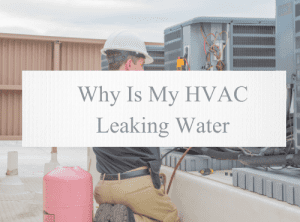Comfort Aire Inc offers the best services of an HVAC repair near me your leaking AC. For more information, you can call (773) 406-7223.
That moment when water starts to pool around your air conditioner and you’re not sure what to do next! Fear not! We can help! Water gathering around your HVAC unit isn’t normal and should be addressed immediately by you or a professional. So, if your HVAC is leaking, here’s what you should do:
First, turn off your device as soon as you observe water collecting to preserve the internal electrical system from further damage (aka more repairs!). No way!).

The next step is to figure out why. The water system works as follows:
- Your air conditioner’s evaporator coil cools the air passing through it.
- When the damp air touches the coil, it condenses.
- Water condenses and drains into a drain pan and a condensate drain pipe.
- The drain line should exit as a PVC pipe near your outdoor AC unit.
Why Is the Water Leaking?
Water leaks occur for a variety of causes, but here are a few frequent ones:
Cold Evaporator Coil:
You’ll know if your AC is straining to chill your home! The evaporator coil may have frozen, causing water to overflow into the drain pan and/or onto the floor. Many factors can cause your coil to freeze, so get it checked out as soon as possible. Call us if you need a second opinion or help to fix it!
Drain Blockage:
The drain line can become clogged owing to seasonal insects, dirt, air pollution, even mildew, and another build-up over time, causing the water to back up!
A Broken Drain Line
That drain line? Yes, this can happen over time or if the unit travels. Instead of going where it should, unconnected water leaks out in a chaotic fashion.
Broken Condensate:
A condensate pump moves water from the drain pan to the drain line. If the pump malfunctions, the water will not properly drain and will pool inside your home.
Damaged Drain Pan:
If the drain pan fractures, splits, or rusts, the water might overflow and leak without being adequately drained. Most of these issues create an HVAC leak, but there may be more or a combination of concerns. If you can’t locate the root problem or solve it yourself, contact a professional. Let us help you!
HVAC Leaking Water Inside
If your A/C is leaking water, act quickly. Turn off your air conditioner and mop up any dripping water before continuing. Water damage can develop within minutes of a leak, so safeguard your home while you examine the cause. While a leaking air conditioner is alarming, most leaks may be readily repaired by an HVAC specialist.
Frozen Evaporator Coil
Several sections of your air conditioner work together to chill your home. The evaporator coil is one of these pieces, and it cools the refrigerant that goes through it. So it extracts heat from your home’s air and sends it to the condenser coil outside.
Without a yearly A/C tune-up, your evaporator coil can accumulate dust and debris. When the coil gets dirty, it can’t exchange heat with the refrigerant. As a result of the evaporator coil becoming excessively cold, ice can form. The coil can become encased in ice over time.
Blocked Drain Line
As previously stated, your A/C removes humidity from the indoor air. Because high humidity makes cooling difficult, your air conditioner eliminates humidity as part of the cooling process.
Like any other pipe in your home, this drain line can get clogged over time as well. Water can back up inside your unit when this happens. A clogged drain will cause water to leak out of the condensation pan onto your floor.
Rusted Drain Pan
The condensation pan is another air conditioner component that might leak. As stated previously, the condensation pan gathers moisture from the air. The water then drains into an inch-deep pan and out the back of your house.
Low R22
Air conditioners don’t use up refrigerant as cars do. False. Your air conditioner’s refrigerant does not need to be topped off. This can result in a hissing or bubbling sound emanating from the system when the A/C is broken.
A/C dripping on the floor
There should be no water around the indoor unit at all times. An indicator of dripping, leaking or clogging. Caution: this is not always a major issue. You can also contact emergency furnace repair near me.
Sweating indoor evaporator coil and suction line (big copper refrigerant pipe wrapped in black insulation). In order to prevent moisture from dripping, black insulation (armaflex) is used. This is a simple remedy when the insulation is missing or has open seams. All armaflex joints should be taped and butted tightly.
During the summer, the evaporator produces a lot of condensation, which drains into a pan. Or into a condensate pump. It then pumps the water outside or into a drain. So, if the coil is unclean, water will drip onto the floor instead of down it. Aside from efficiency, this is one incentive to clean the coil annually.
Unclean coils create clogged drains, dirty water, and clogged drain traps. This is usually cleaned out by draining water down the cleanout cap and using a long flexible cleaning brush. Recall that dirt may jam a drain quickly.
An attic or a finished basement can be particularly vulnerable. Determining the size of the air filter is also critical. Indoor coils might frost up. It drops onto the floor when the ice melts. During the cooling season, your system should not have any ice on it.
Should My Ac be Dripping Water
A/C leaks water outside? A puddle slowly becomes a large pool. Placing buckets under the leak usually works. Although most air conditioners leak water, knowing when yours does is critical. Why is my HVAC leaking water?
Water amount
Two things impact how much condensation your air conditioner produces:
- The thermostat is controlled by complex electronics.
- Coils can freeze in cold weather, causing a lot of moisture.
- Due to the high temperatures and humidity your air conditioner is working hard. But a pool is not a little gathering. This means it’s time for HVAC Aire Comfort Inc repair.
Causes of AC Water Leaks
Filter sand
A filthy, dusty, or partially obstructed AC air filter creates ice buildup on the evaporator coils. This causes water buildup in the drain pan.
Pan with a crack
It works on old AC. Leaking water from the condensate pan might occur over time. Professionals should always do this, not homeowners.
Drain Clog
Air conditioner water drains to a drain pan via a sophisticated system of drain pipes. Drain line debris causes water leaks from the air conditioner. A clog in the condensation drain from the AC unit might cause water to back up and spill out. Pour a cup of bleach down the drain near your air conditioner to destroy bacteria. Call a professional if the condensation line is plugged.
Installed
This is common when installing a new AC. Water leaks from drainage pans that are too big or too little. This can cause AC leaks. The incorrect installation has led to several new AC unit failures. This causes water loss and poor cooling. The EPA estimates that 50% of all air conditioners in the US don’t operate as advertised.
Only a professional service like Aire Comfort can ensure the correct setup. It takes a pro to understand ducting, cooling systems, airflow, and how much refrigerant to put in an AC. Incorrect installation might cause a series of costly system breakdowns.
It’s too cold.
The air conditioner may leak if it’s below 55 degrees. This can cause a puddle of condensate near your AC system. In this case, turn off the device to thaw the coils.
Rationing
Like a water leak, a refrigerant leak. Because of the low refrigerant levels, the AC system’s pressure drops, causing ice to build in the evaporator coils. The result is a big drain pan overflow.
AC leaks
All air conditioners have seals to prevent hot air buildup. Hot air enters when they are misfit, loose, or structurally weak. Condensation occurs when heated air hits cold air inside the device. A professional must reseal the device. Inexperienced DIYers may pose further complications. Let Aire Comfort and repair the problem. The remedy to all of these concerns is regular maintenance. The drain lines, air vent, and p-trap are inspected.
